- In English
- 2010s
- hungary
- politics
- top 10
- decade
- fidesz
- viktor orbán
- pál schmitt
- fundamental law
- illiberal democracy
The decade of illiberalism - the 2010s in Hungary

További In English cikkek
1 - The System of National Cooperation
"I am delighted to report that today's attempt to conquer the peak with no supplementary oxygen was successful. Fidesz and KDNP gained 68% of the seats in the Hungarian Parliament. "
-announced Viktor Orbán on 25 April 2019, after his party's expected landslide victory at the 2010 general elections granted Fidesz a supermajority in the Hungarian National Assembly. His triumphant speech sounds somewhat ironic a decade later:
"Today, a record was set by a European country that only made negative headlines in the world and received condescending opinions."
Orbán fueled the ecstasy of his supporters by claiming that this new record is a "worldwide success" as what happened was not only the sixth free election in Hungary but also:
"a revolution in the polling booths. Hungarians proved that democracy still matters, as democracy enables changes the likes of which could only be accomplished earlier by revolutions. (...) We learned the lesson of the fall of communism, namely that systems cannot be changed, only toppled and overthrown before creating a new one. This day, Hungarians have overthrown the system and created a new one. The old system of leaders abusing their powers and using it for personal gains was replaced by a new system, the system of national unity."
Viktor Orbán noted in an official tone that "as of today, the political and economic system of Hungary is called the System of National Cooperation," meant to rebuild and strengthen the country. "In this system, we will aid and encourage each other, so we would dare to set great goals and work together to achieve them," he added.
Orbán said national cooperation is an opportunity and an expectation for all - up to and including Hungarians outside of the country's borders. Orbán noted that there were going to be new rules, and the government would spearhead the process of turning these new rules into law. "The days of politics serving private interests are over, and we will not allow them to return."
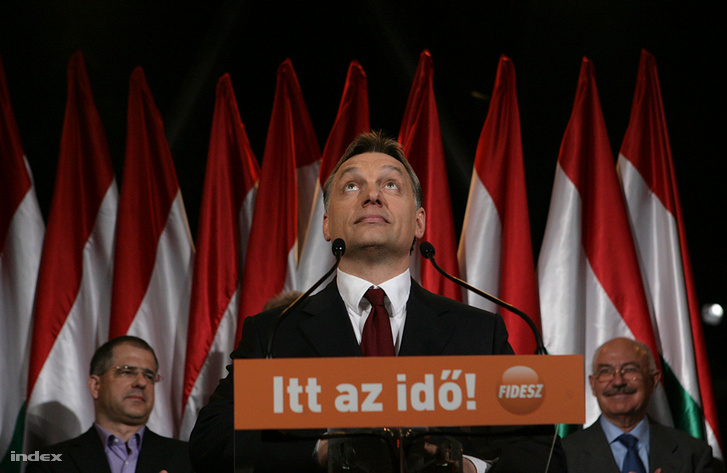
With the collapse of the incumbent Hungarian Socialist Party (MSZP) and the parliamentary supermajority of Fidesz, the 2010 general election did bring about an entirely new system, and with the inaugural meeting of Parliament on 14 May 2010, a new decade dawned on Hungarian politics.
2 - A new system needs a new constitution
On 25 April 2011, the President of Hungary Pál Schmitt signed the new Fundamental Law of Hungary, replacing the country's 1949 constitution which reflected Hungary's communist past in its title but went through a major overhaul after the fall of communism.
The signing was celebrated by fanfares and a ceremonial change of the guard at the Sándor Palace, the residence of the Hungarian President. The Fundamental Law entered into effect on 1 January 2012 after being passed by Parliament on 18 April 2011. 262 MPs voted for the new constitution (Fidesz-KDNP's lawmakers and an independent MP), 44 voted against (Jobbik's parliamentary group and two independent MPs), and MSZP and LMP (Politics Can Be Different, green party) were absent from the vote.
Despite keeping the intention to draft a new constitution under wraps during the campaign, Viktor Orbán made the announcement right after the formation of his government. Instead of a referendum, the government sent out a survey with twelve questions to the 8 million voters - the government received approximately a million answers. Fidesz-KDNP scrapped the idea of an extra vote per child based on the responses to the survey, however, in other cases, the new constitution did not reflect public opinion at all, nor the points included in the material prepared by a group of experts supposedly to support the drafting process. During the debate in Parliament, the parliamentary group leaders of Fidesz and KDNP submitted more than 150 proposed changes, and the temporary provisions of the Fundamental Law were also the subject of major controversy.
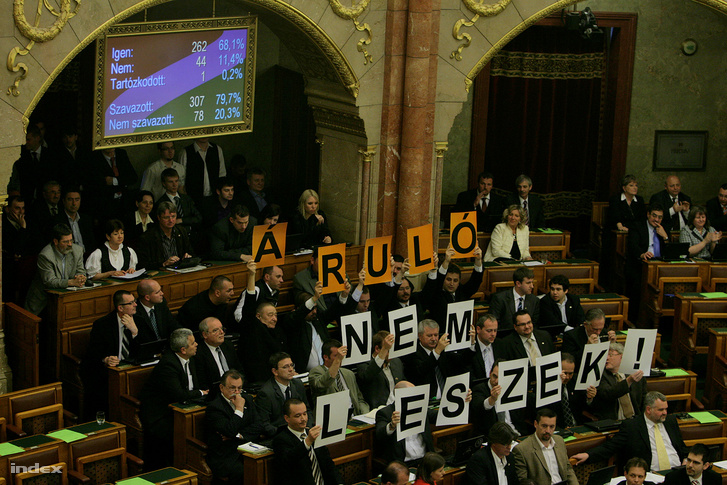
The new constitution created solely by the governing coalition faced resistance from political parties, civil society, and unions, and experts also starkly criticised the new Fundamental Law. On 2 January 2012, the government held a gala in the Hungarian State Opera celebrating the Fundamental Law's entry into effect, which prompted the first major protest against Viktor Orbán's government.
Since then, the Fundamental Law was amended eight times.
3 - The fall of a President
On 3 April 2012, in an unexpected speech in Parliament, President of the Republic Pál Schmitt announced his resignation, leaving the National Assembly 15 days to elect a new President, which is how János Áder first acquired the position. Schmitt's resignation came after a scandal around the President's doctorate.
News website Hvg.hu was the first to break the story that a large chunk of Schmitt's 1992 dissertation (around 180 pages of 215) was an unattributed, direct translation of a study written in the eighties by Bulgarian sports researcher Nikolay Georgiev, and a week later, Index revealed another long passage (17 pages in all) to be lifted from the work of German sports sociologist Klaus Heinemann. In March, several other pages were found to be the result of plagiarism.
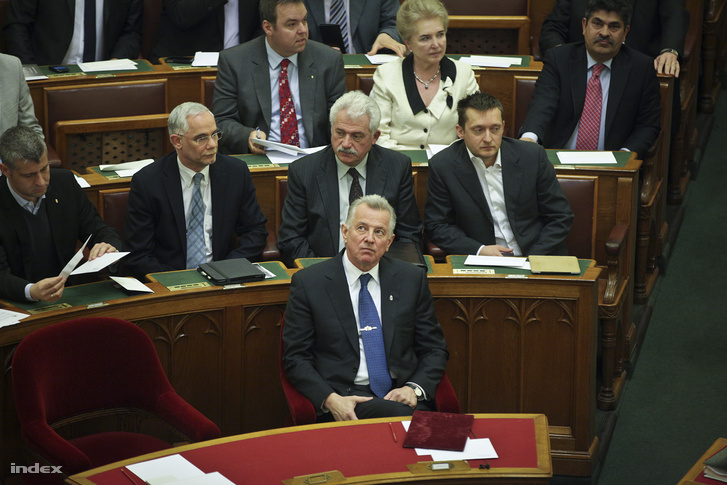
At the time, Schmitt claimed he acted in good faith, but the Semmelweis University's investigation ended up affirming accusations of plagiarism and the university revoked Schmitt's doctorate on 29 March 2012. Two days later in a memorable interview on public television, Schmitt vowed to get another doctorate, but we are still waiting for that to happen. Prime Minister Viktor Orbán spoke about the incident twice, citing the Fundamental Law on both occasions, saying: "the President of the Republic is inviolable."
4 - The fourth amendment
The fourth amendment of the Fundamental Law was the starting point of the political process that seems to have defined the 2010s in Hungary the most. The controversial bill was submitted to Parliament on 8 February 2013 by MPs of the governing coalition and went through heavy modifications before the final vote at the beginning of March. The version ultimately passed by the Parliament introduced the following changes (amongst others):
- Definition of the family - The amendment stated that family ties are based on marriage and/or the relationship between parents and children, and defined marriage as the union of a man and a woman, constitutionally excluding same-sex couples from the definition of the family, a passage often cited when defending homophobic remarks.
- The President's powers - The President can no longer turn to the Constitutional Court regarding the contents of a constitutional amendment, the head of state is only allowed to make procedural complaints about the legislative process.
- Powers of the Constitutional Court - The amendment took away the power to inspect the contents of constitutional amendments from the the Constitutional Court as well, and also limited the court's procedure to the scope of the initiating motion, meaning they can only examine the constitutionality of laws to the extent included in the complaint. The amendment also voided earlier decisions of the Constitutional Court.
- Status of churches - Only the decision of a parliamentary supermajority can recognise a religious group as a church. This was just weeks after the Constitutional Court deemed the same provision unconstitutional.
- University autonomy - The amendment gave the government control over the financial management of universities, stripping them of an important part of their autonomy, and constitutionalised "trapping" state-sponsored university graduates in Hungary for ten years, a policy which the Constitutional Court also revoked earlier.
- Homelessness - The amendment also laid down the constitutional groundwork for the criminalisation of the homeless, a measure that was only implemented five years later.
- Fines - The amendment allowed the government to introduce new taxes if, for instance, the European Court of Justice or a similar court hits Hungary with a fine which the reserves created for that purpose in the budget do not cover.
Former President László Sólyom, NGO-s, and experts said at the time that this was the final nail in the coffin of Hungarian rule of law, as the amendment lifted provisions deemed unconstitutional into the Fundamental Law, creating internal incoherence, and it also weakened the mechanisms set up for the protection of fundamental rights, making them more vulnerable to future attacks.
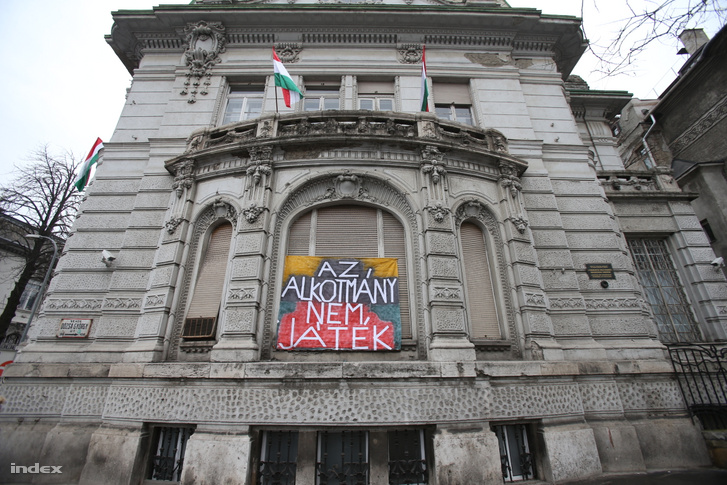
President of the European Commission at the time José Manuel Barroso expressed his worries to Orbán over the phone and later in a letter addressed to the Hungarian PM as well, but the US State Department and the Secretary-General of the Council of Europe also voiced concerns, but to no avail - the Parliament adopted the amendment on 11 March 2013. A series of international procedures followed suit, and this was the measure that ultimately led to the unification of the EU procedures against Hungary.
5 - The Illiberal State
"We have to break away from the liberal methods and principles of organising our society"
- said Viktor Orbán at Tusványos, Fidesz's annual Transylvanian gathering in neighbouring Romania on 25 July 2014. The liberal state must be replaced by a national state which is no longer a collection of individuals but a community which has to be developed and strengthened, the Prime Minister elaborated, adding that in this sense, he is building an illiberal state.
"Democracy is not necessarily liberal. (...) Just because something is not liberal, it can still be a democracy."
Orbán added that Hungarian citizens expect their leaders to conceive the new Hungarian state: "We will be searching for the new Hungarian state, we will try to find how to organise our community in a way that is free from the dogmas and ideologies generally accepted in Western Europe, that can make our community competitive in the world's great contest." He pointed out China, India, Turkey, and Russia as examples that Hungary should follow, as these countries have successful state models that are not liberal or Western.

The lecture gave rise to many different interpretations and fueled international outrage. Somewhat taken out of its original context, the term "illiberal state" started to mean a Hungary that is distancing itself from Western democracies and turning to the East. Though Orbán was criticised before, this speech drew the attention of international media and even two US Presidents (Bill Clinton and Barack Obama) chimed in on the debate. The speech was mostly interpreted in the West as Orbán intending to reform Hungary based on the models of China, Russia, and other hybrid regimes and authoritarian states.
Since then, this ideology was rebranded as "Christian freedoms", but the core collectivist approach remained the same.
6. An oligarch goes berserk
One of the sharpest political turns of the 2010s came in early 2015, when Orbán's long-time friend, confidante, and oligarch Lajos Simicska (often said to be the financial mastermind behind the rise of Fidesz) fell out with the Prime Minister in a rather spectacular manner. After most leaders of his media portfolio resigned on the morning of 6 February 2015, Lajos Simicska went on a rampage. "I'll go in there and fire all the Orbánists," he told journalists while yelling expletives about his old comrade into the phone.
Simicska's outrage surprised most, though those who paid attention to the power shifts in and around Hungary's ruling party knew that something like this was in the works: Simicska had been losing his privileged position in Fidesz since the party's 2010 landslide victory, and as other oligarchs were lifted up, his influence diminished. "In 2012, Orbán decided that if they win once again, he will push Simicska in the background," an unnamed, high-ranking official of Fidesz told hvg.hu back in 2014. And indeed, the advertising tax first introduced in 2014 was tailor-made mostly to disadvantage Bertelsmann's Hungarian subsidiary M-RTL, but it also significantly affected the bottom lines at Simicska's media outlets, just as his trusted people were increasingly forced out of government positions. On 5 February 2015, the oligarch told political daily Népszava that if Orbán cuts him off from state advertising revenues, that would mean a "total media war." The following day, as we mentioned above, the leadership of political daily Magyar Nemzet, weekly paper Heti Válasz, news channel Hír TV, and Lánchíd Radio had all resigned citing "reasons of conscience", and Simicska subsequently turned his media against his former allies.
However, his rebellion did not last long - in 2018, two days after Fidesz won their third consecutive supermajority in the Parliament, Simicska folded, shutting down Magyar Nemzet, Lánchíd Rádió, and Heti Válasz, and also allowing Fidesz to take back Hír TV a few months later. To add insult to injury, the flagship of Simicska's media empire Magyar Nemzet was relaunched as pro-government propaganda by Fidesz's media conglomerate exactly four years after the memorable public meltdown of its former owner.
7 - The sudden closure of Népszabadság
On Saturday 8 October 2016, a short press release informed that Mediaworks had decided to suspend publication of Népszabadság, one of the most influential political dailies of Hungary. This move was a surprise even to the staff who left their belongings packed into boxes on Friday as the paper was set to move offices over the weekend - a celebration was even scheduled for Sunday, however, when journalists rushed to the offices as news of the ultimately permanent suspension broke, they only found closed doors.
The publishing company insisted that the suspension is only temporary and the paper would be relaunched as soon as its new concept is ready. At the time, Népszabadság was owned by Mediaworks, a business interest of Austrian investor Heinrich Pecina - his name may be familiar from the scandal of former Austrian vice-chancellor Heinz-Christian Strache. During his famed Ibiza meeting with the fake Russian oligarch, the disgraced leader of far-right FPÖ suggested that Pecina should help with the purchase of Kronen Zeitung, as he had already "bought up all Hungarian media for Orbán over the past 15 years and primed them for him." Pecina acquired Népszabadság from Ringier (along with most of the publisher's portfolio) after the Hungarian Competition Authority denied their merger with Axel Springer in 2014.

According to the official explanation, the paper's circulation diminished by 74% over the course of its last ten years (though it was still the highest in the relevant market), it amassed 5 billion Forints (~€15 million) in losses, and the closure was nothing but business rationale at work, a point often echoed by Fidesz communication. Mediaworks denied rumours that the move was necessary due to Fidesz's oligarch Lőrinc Mészáros circling the company, however, Mészáros's Opimus Group announced the acquisition of Mediaworks on 25 October 2016.
Mediaworks went on to become the centrepiece of the Central European Press and Media Foundation, the giant pro-government media conglomerate assembled from oligarchs' donations in November 2018 - the Competition Authority did not intervene that time, as Viktor Orbán personally exempted the merger from the governing regulations.
8 - Ousting CEU
The Hungarian government submitted an amendment to the Act on Higher Education to Parliament on 28 March 2017 which was, in theory, meant to prevent fraudulent foreign universities handing out worthless degrees. In practice, it was a surgical strike on the Central European University, an institution founded by Hungarian-born US investor George Soros. Without any consultation with stakeholders whatsoever, the bill was rushed through Parliament by 4 April, causing major international backlash countered by aggressive communication from the part of the Hungarian government, which did not abstain from gaslighting the public about what is going on in the rather complicated situation created around CEU.
Despite the fact that the Hungarian government has a tendency to blame George Soros for pretty much anything, his name did not originally come up as an explanation for the troubles CEU was put through - they insisted that the institutional harassment of the 25-year-old establishment only serves the fairness of tertiary education. At a press conference held by then-Chief of Staff János Lázár, the matter was cleared up though:
"We peacefully co-existed, CEU and the Fidesz government, the change in that situation only occurred after Soros proclaimed his plan to open Europe's borders and bring a million immigrants to Europe every year"
- he said, referring to George Soros's article published on Project Syndicate in 2015, though by this time, Soros published other opinion pieces revising that number, writing in 2016, a year earlier, that if the EU accepted 300 000 refugees annually, "genuine asylum-seekers would view their odds of reaching their destination as good enough to deter them from seeking to reach Europe illegally – an effort that would disqualify them from legal admission."
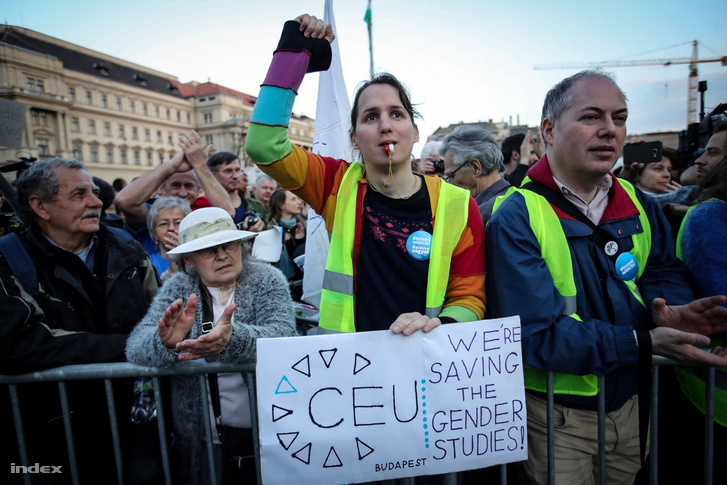
In the end, the Hungarian government never signed the international agreement and CEU ended up moving to Vienna, Austria in order to ensure that students enrolled for the upcoming academic year could begin their studies in a safe and predictable legal environment.
9 - The Sargentini Report
On 12 September 2018, the European Parliament adopted a report on the situation in Hungary assembled by then-MEP Judith Sargentini. The report states that there is a clear risk that Hungary is seriously breaching the European Union's values, and its adoption meant the initiation of the Article 7 procedure against Hungary - the hearings are currently ongoing, conducted by the Presidency of the European Council.
The Hungarian government calls Sargentini's report a collection of lies, however, the document does a good job of highlighting the key complaints against the Hungarian legal system and administration. These complaints point towards the violation of democratic principles, the rule of law, and human rights in Hungary.
The Hungarian government compiled a rebuttal in English, and the Parliament's Fidesz-KDNP supermajority passed a resolution condemning the report adopted by the European Parliament. Still, the 160-page document defending the government does not really reassuringly address the report's claims about legislation limiting the powers of the Constitutional Court, Fidesz overwhelming election campaigns with state advertising, the political ownership of the press, sending judges into early retirement, tailor-made legislation ousting CEU, the state not doing enough to end violence against women, discrimination against Roma at schools, and the criminalisation of the homeless.
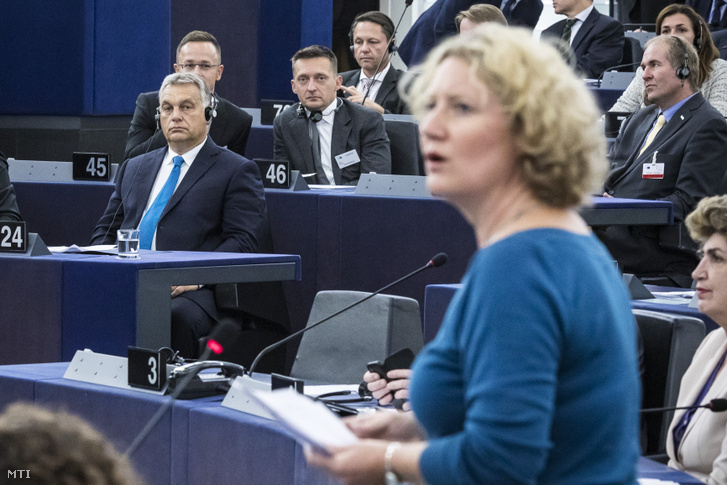
Besides these matters, the document underlines a couple of specific cases related to for instance István Tiborcz, the son-in-law of the Prime Minister whose company Elios was under OLAF investigation for suspicion of organised crime until the Hungarian government ultimately decided not to submit invoices related to their projects (leaving Hungarian taxpayers footing the bill).
But the Article 7 procedure is not going to stay in the past decade, as it can still last a long while. At the moment, leaders of EU member states hold hearings over the Hungarian situation possibly breaching the values of the EU.
10 - The municipal elections
On 13 October 2019, the joint mayoral candidate of the opposition Gergely Karácsony scored a surprise victory in Budapest and the opposition managed to take 14 out of the capital's 23 districts, and 10 out of 23 cities with county rights.
This was the best election result the opposition could achieve in the entire decade, and analysts are saying that this breakthrough is largely attributable to the fact that opposition parties have managed to come to an agreement over having single joint opposition candidates running against Fidesz's candidates in the most crucial constituencies, a strategy which seems to have been able to crack what Orbán described in 2009 as the "central political forcefield," and also dismantled the myth of the System of National Cooperation's invincibility.

However, analysis is made more difficult by the huge scandal that unfolded a mere week before the elections - photos and videos showing Fidesz's mayor in Győr Zsolt Borkai with prostitutes on a yacht in the Adriatic Sea were leaked by an anonymous blogger calling themselves the "Devil's Advocate" which connected the mayor's debauchery to suspicious real estate deals of the city and carmaker Audi, and while this surely mobilised extra opposition voters, it's next to impossible to tell how much the abovementioned victories can be chalked up to the 'Borkai-effect."
What seems to be sure is that the scandal's shockwaves travelled far from Győr, and not only because of the stark contrast between the scandal and the Christian-conservative moral high ground Fidesz's politicians prefer to speak from. The campaign leading up to the municipal elections had probably been the dirtiest to date, with several politicians getting caught up in sex scandals, leaks, drug abuse and corruption allegations, and these tactics remained even after the elections concluded: In December, two more politicians, MSZP's Budapest president Zsolt Molnár and II. district mayor Gergely Őrsi were also accused of having secret orgies with prostitutes and drugs by a copycat blog called "Angel's Advocate" (though the blog did not directly name them), and DK's MP Zsolt Gréczy resigned after photos of his private parts were sent to the press along with a letter accusing Gréczy of harassing a young woman with said photos and ceaseless messages.
Airing out the dirty laundry of politicians in this manner was unusual before the 2019 municipal elections, but it seems that this new strategy is bound to shape the political discourse of the 20s as well.
This article was based on the original published in Hungarian on Index.hu on 26 December 2019.

Support the independent media!
The English section of Index is financed from donations.



